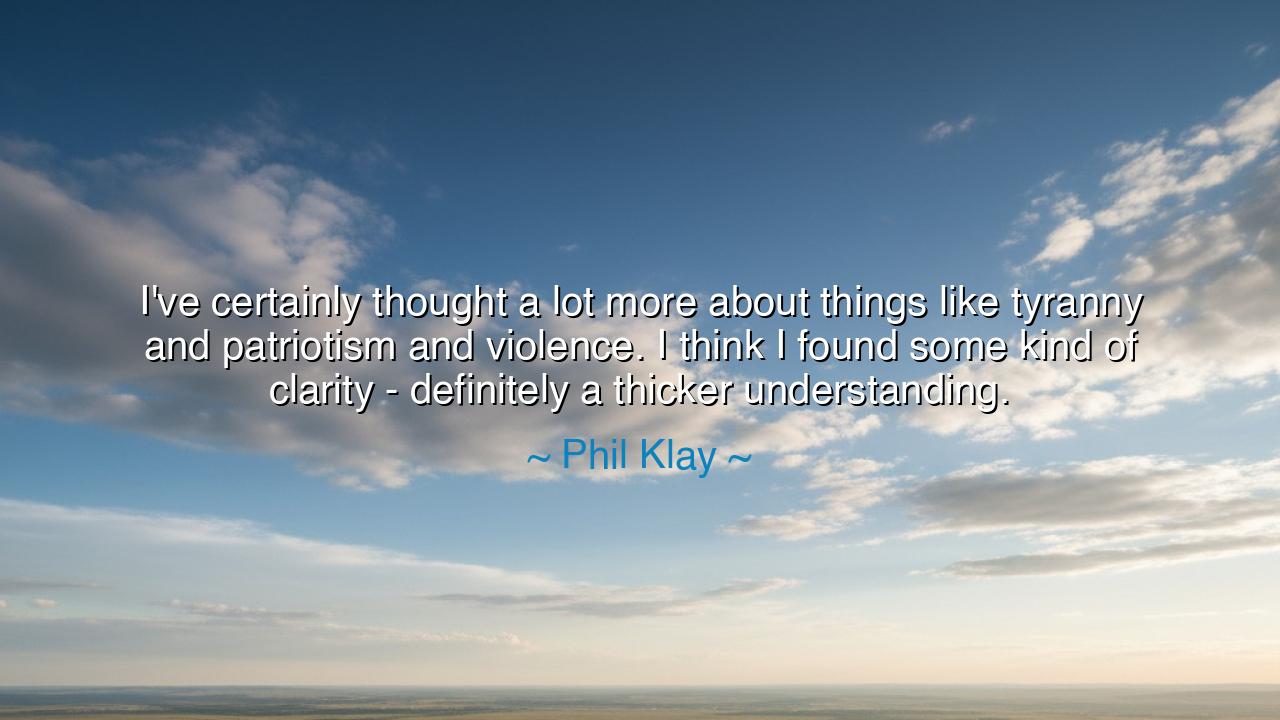
I've certainly thought a lot more about things like tyranny and
I've certainly thought a lot more about things like tyranny and patriotism and violence. I think I found some kind of clarity - definitely a thicker understanding.






The words of Phil Klay—“I’ve certainly thought a lot more about things like tyranny and patriotism and violence. I think I found some kind of clarity—definitely a thicker understanding.”—are not the musings of one untouched by struggle, but of a soldier turned storyteller, a man who has seen war and sought meaning in its wake. His voice carries the weight of experience: the kind of wisdom that is not born in libraries, but in deserts and battlefields, in the silence that follows both gunfire and grief. These words remind us that there are truths so profound they cannot be grasped lightly—they must be lived, suffered, and wrestled with before they yield their depth.
To speak of tyranny, patriotism, and violence is to speak of forces that have shaped human destiny since the dawn of nations. Tyranny is the shadow of power corrupted, when rulers devour their own people and enslave them to fear. Patriotism is the flame of loyalty, sometimes noble and unifying, sometimes twisted into a banner of blind obedience. Violence is both the tool of the oppressor and the cry of the oppressed, a double-edged blade that can liberate or destroy. Klay’s “thicker understanding” is an acknowledgment that these forces are never simple; they are woven together in the tangled fabric of human history.
The ancients wrestled with these very themes. Thucydides, in his account of the Peloponnesian War, revealed how patriotism could drive men to greatness, but also to unspeakable cruelty. He told of Athens, once a beacon of democracy, sliding into tyranny over others in the name of empire. He showed that violence, unleashed without wisdom, consumes not only the enemy but the soul of the nation that wields it. Klay’s insight stands in this lineage: a recognition that easy answers vanish in the crucible of conflict, and what remains is the need for clarity and humility.
History gives us countless examples. Consider Abraham Lincoln, who in the midst of America’s Civil War wrestled with the weight of violence. He knew that the war was a furnace of blood, yet he also saw that without it, the shackles of slavery—the greatest tyranny upon the land—could not be broken. His patriotism was not blind loyalty, but a devotion to the deeper ideals of liberty and union. In Lincoln, as in Klay’s words, we see that clarity often emerges not from certainty, but from the struggle to reconcile conflicting truths.
Klay’s reflection is also personal, for he, as a veteran, speaks with the memory of comrades lost, of battles fought under the banner of patriotism, and of the sobering reality that not all missions are pure, not all wars are just. His “thicker understanding” is the hard-won knowledge that slogans cannot capture the full cost of conflict, and that true wisdom requires us to hold both pride and sorrow together in our hearts. To think of tyranny, patriotism, and violence only in the abstract is easy; to confront them in life is to be changed forever.
The lesson for us is profound. We must not treat these words as mere ornaments of political debate. Instead, we must seek our own clarity, recognizing the dangers of tyranny, cultivating a patriotism rooted in compassion rather than hatred, and approaching violence with fear and reverence for its power. True wisdom lies not in rejecting these realities, but in wrestling with them, as Klay has done, until we emerge with an understanding thickened by humility and compassion.
Practical action is within our grasp. Question authority so that tyranny does not take root in silence. Practice a patriotism that serves your nation by serving humanity, not by despising others. And when confronted with violence, whether in word, act, or policy, weigh its cost with the gravity it deserves. Do not be quick to cheer it, nor blind to its necessity in rare moments of defense. Instead, carry the weight of it with solemnity, always seeking the path of peace first. In this way, each of us can grow toward that same “thicker understanding” Klay discovered.
Thus, his words are not merely the testimony of one man, but a teaching for all generations: the world is filled with shadows and fire, but clarity is possible if we dare to look unflinchingly at reality. And in that clarity lies the hope that future generations may be wiser, gentler, and stronger than we have been.






AAdministratorAdministrator
Welcome, honored guests. Please leave a comment, we will respond soon